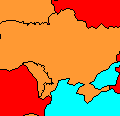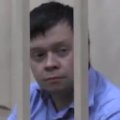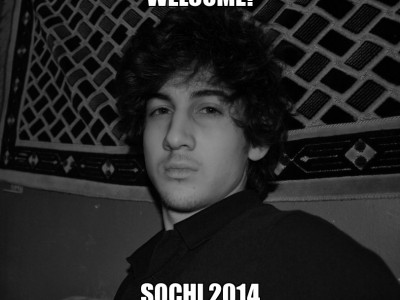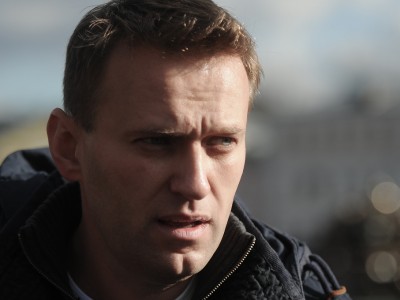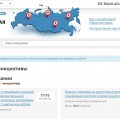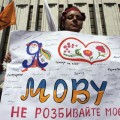Stories about Eastern & Central Europe from April, 2013
Potty-Mouthed Russian Blogger Faces Prison for Ethnic Slurs
A blogger from the Republic of Bashkortostan (a small autonomous republic neighboring Tatarstan in southern Russia) was recently charged with hate speech for a post she published on her Facebook account late last year.
Ukraine's TVi Saga: 31 Journalists Resign
On FT.com's beyondbric blog, Graham Stack writes [en] about the “murky takeover” and “a tangled history of offshore ownership” of the Ukrainian TV station TVi, 31 of whose journalists resigned...
Ukrainian Lawmakers Propose to Ban Abortions
In early April, three MPs from the opposition political force “Svoboda” registered a bill that would ban abortions in Ukraine. Tetyana Bohdanova reports on the online reactions to this legislative initiative.
Russian Conspiracy Theories About Boston Bombings Abound
"Bush blew up the Twin Towers, Putin blew up [the towns of] Buinaksk and Volgodonsk. Obama blew up the marathon." The RuNet, just like the Internet at large, has always had a penchant for conspiracy theories.
RSF Addresses the Situation at Ukraine's TVi Channel
On April 26, Reporters Without Borders (RSF) issued a statement [en; fr; uk – .pdf] on the situation at the Ukrainian TV station TVi: Reporters Without Borders condemns the sudden...
Chernobyl: “The Most Horrifying Phone Talk of the Century”
April 26, 2013, marks the 27th anniversary of the 1986 Chernobyl Nuclear Power Plant disaster. Andriy Pryimachenko of peredova.com has created a video transcript [ru] of the audio recordings of...
Hungarian Students Blog on Freedom of Information Requests
Hungarian grassroots student union Hallgatói Hálózat (Student Network) started a blog that curates freedom of information requests related to higher education. The blog, titled Transparent Education [hu], is using the Hungarian public freedom of...
“Manipulative” Coverage of Macedonia's Media Law
“Practice indicates that responsible and ethical journalism is never the result of state legislation and regulations, but of the voluntary compliance with the code created by the media community itself.”...
“TrashOut”: RuNet's Interactive Map of Illegal Dumps
A new 'illegal dumps' interactive map has been launched in Russia for iOS and Android devices. The first of its kind in Russia, it allows users to mark unauthorized landfill sites.
Bosnia & Herzegovina: “Dark Times, Black Humor”
A Sarajevo-based Boston native writes on Notes from Sarajevo Tumblr blog that “the last few days [since the Boston Marathon bombings] have served as a reminder of Bosnia’s particularly dark...
The Russian Opposition “Snake Pit”
The Russian opposition is at war with itself, and it’s thanks to more than the usual ideological tectonics. The various fault lines that infamously allow the Kremlin to “divide and conquer” Russia’s would-be saviors are indeed political, but the divisions are every bit as much about idiosyncrasies and shady dealings. Just look at May 6.
The Boston Bombings Come Home to Russians
Initially a distant story of bombs and American blood, the Boston Marathon bombings came home to Russians today. The RuNet had been following the investigation into the attacks with great interest, even before the news that the two suspects turned out to be ethnic Chechens. Now that Russia is directly involved, passions burn white hot.
Russian Journalist and Election Observer Speaks about Her Arrest
Earlier this week, RuNet Echo published an article about Svetlana Lokotkova, a Russian journalist and election observer who was arrested and removed from an overnight train for alleged intoxication. Lokotkova later contacted RuNet Echo, and agreed to outline what happened on the train and in the police station in her own words. She also spoke about social media as a tool for political activism.
Snow, Charity, Football: Scottish Fans Earn Praise in Serbia
The fans of the Scottish national football team, who came to Novi Sad to root for their team in the March 26 game against Serbia, ended up being praised by Serbia's fans all over social media sites and news channels. Danica Radisic and Dijana Djurickovic explain why.
Before Trial, Navalny Nominated as Russia's “Political Enlightener”
As Alexey Navalny is gearing up for his embezzlement show-trial in Kirov, there is at least one silver lining: he made it on the short-list of the Russian award Politprosvet (literally "Political Enlightenment").
Beer & Twitter Prove Toxic Mix for Russian Journalist
Trains are a cheap and reliable way to get around Russia, particularly compared to the country's famously poor roads. Russia is a big country and journeys between cities can take hours (or even days). Given these difficulties, it is not uncommon for some passengers to have a drink or two to pass the time. Sometimes people—even journalists—can overdo it.
“Wanted Dead or Alive”: Slovak PM Dodges Court Summons
Former Slovak PM Iveta Radičová is suing the current PM Robert Fico, demanding an apology for his offensive statement. Fico, however, has been ignoring the trial for a whole year now, and even the police cannot find the PM's address to serve him court summons. Tibor Blazko reports.
Running 1,000 Miles for Europe's Trafficked Children
This month, Rob Martineau, Tom Stancliffe, and Guy Hacking are running 1,000 miles from Odessa to Dubrovnik, via Ukraine, Moldova, Romania, Bulgaria, Macedonia, Kosovo, Montenegro, and Croatia, as part of...
Russia's #1 Netizen Heads to Trial
Pussy Riot, eat your heart out. Later this week, Russia’s most polarizing blogger, Alexey Navalny, will stand trial for embezzling roughly half a million dollars from a state-owned timber company in the city of Kirov. In a country constantly plagued by politicized legal proceedings, prosecuting the nation’s most prominent netizen promises fireworks.
Fancy Cars and Booze Fuel Russian Online Petitions
A Russian government online petition platform went live on April 2. RuNet Echo takes a look at how it works in practice.
Ukraine's Language Issue: Voices From the Ground
Ukrainian politicians' views on the language issue are well-known. But what do ordinary Ukrainians think of it? And how does it affect the people who reside in the predominantly Russian-speaking areas of Ukraine - those who are the target audience of the politicians who, in 2012, voted in favor of the language law?



